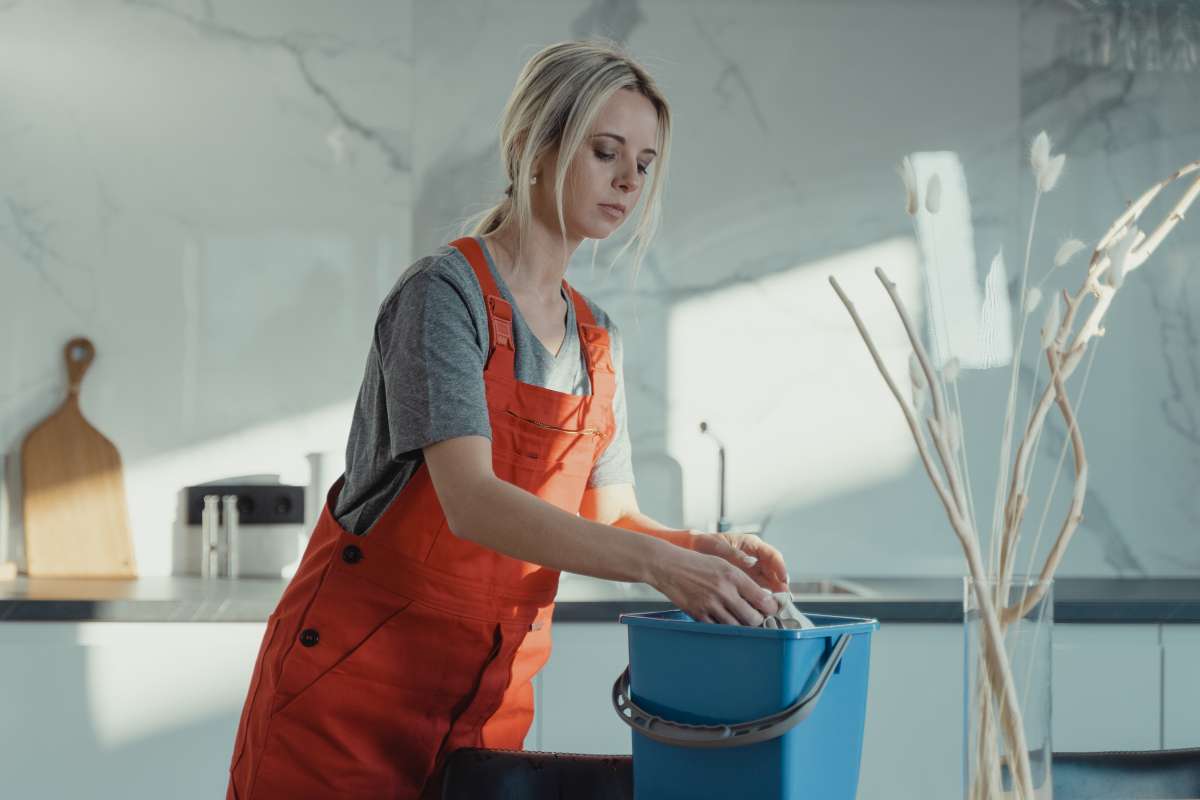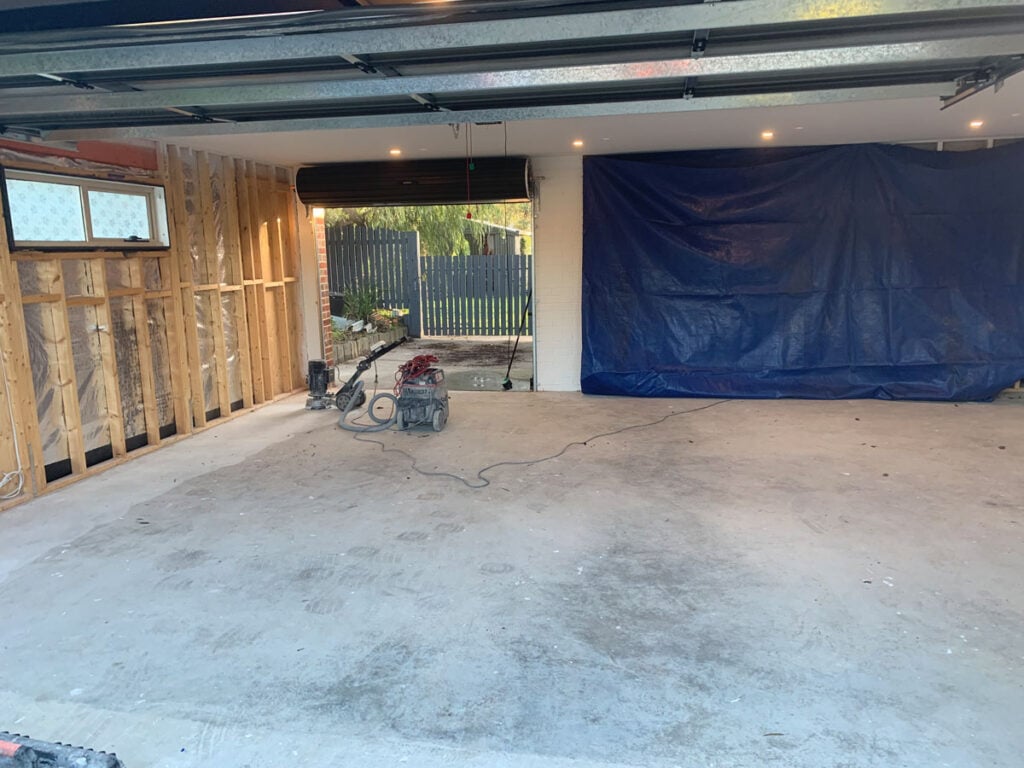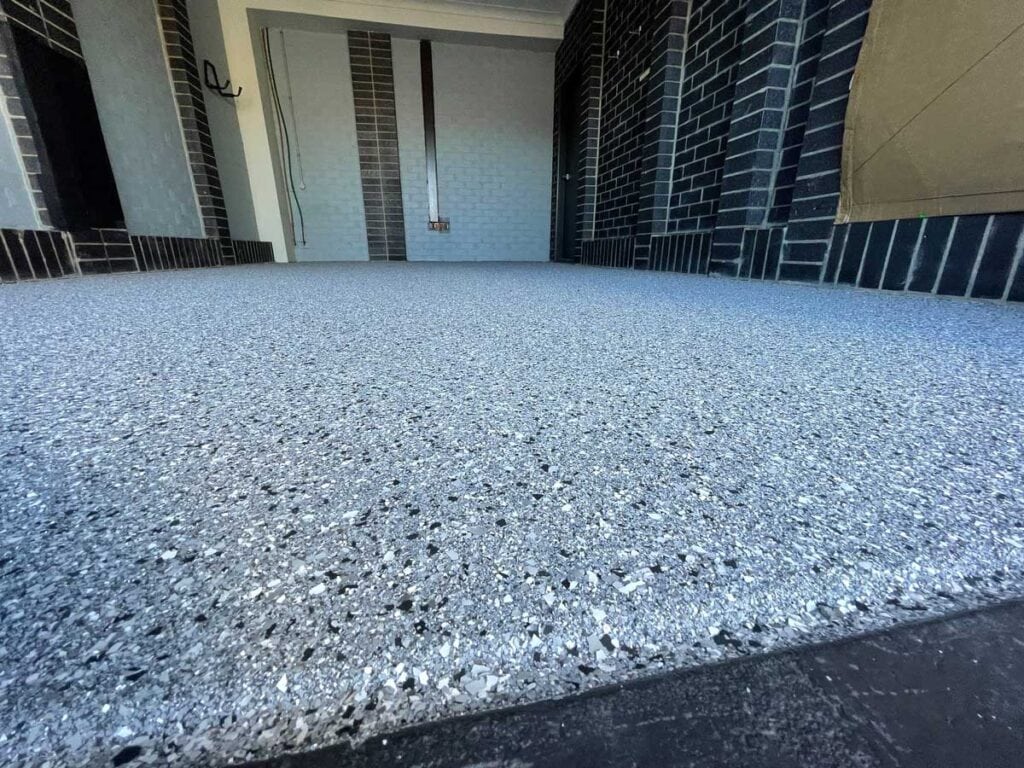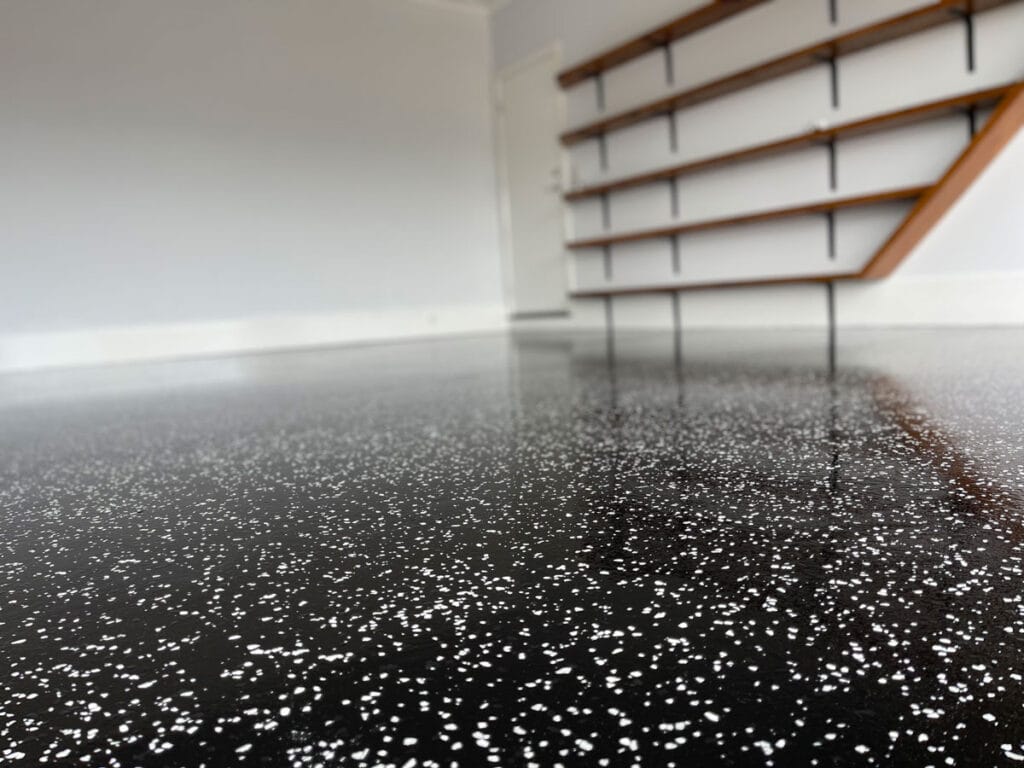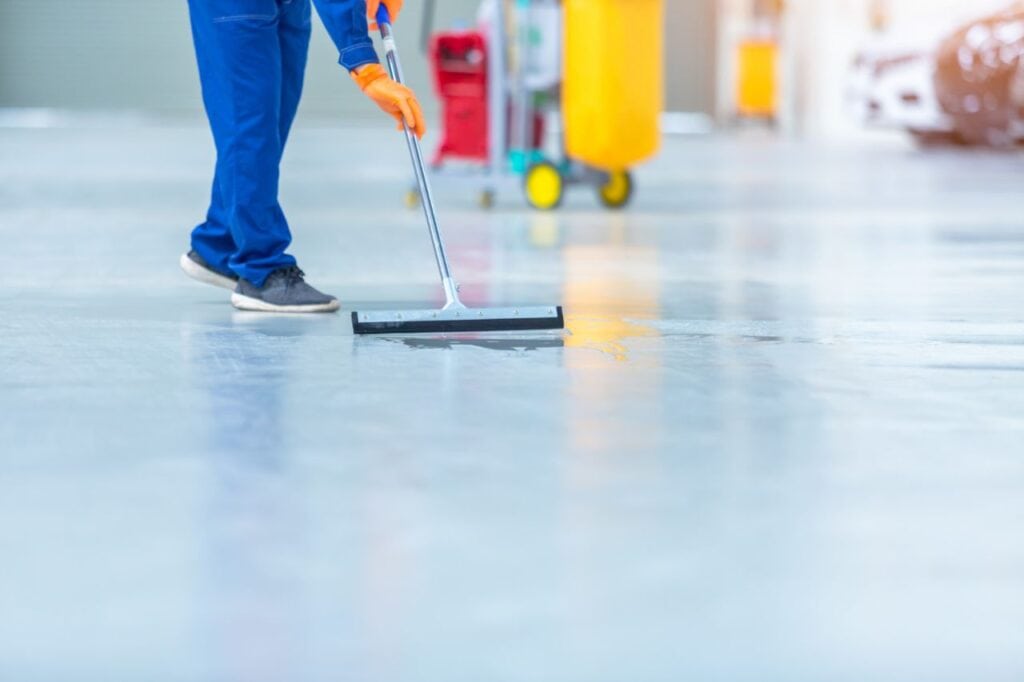Whether you want to update worn-out floors or protect your concrete surface, epoxy floor coating can completely transform your space while strengthening your flooring. This type of floor coating is surprisingly versatile, providing excellent preservation for concrete surfaces and offering protection against substantial impacts, all while creating a glossy, attractive finish.
Many homeowners are discovering the benefits of using epoxy flooring as a sleek, elegant, and low-maintenance option for various areas of their homes, provided it is installed correctly. Epoxy coatings for floors are ideal for both residential and commercial spaces.
While epoxy coatings are commonly associated with commercial flooring and garage floors, they offer numerous advantages that outlast traditional floorings. Epoxy flooring is highly durable and sustainable and can be customized to suit different preferences, ensuring longevity. Additionally, its resistance to wear and tear makes it particularly beneficial for areas with heavy foot traffic. Let's explore epoxy floor coatings and why they are so famous for commercial spaces.
What Is Epoxy Flooring?
Epoxy is a term used to describe a combination of hardeners and resins that, when mixed, undergo a chemical reaction. This reaction forms a rigid plastic material composed of tightly interconnected cross-polymer structures. This material forms a strong bond with most base layers when applied to surfaces, resulting in a resistant and durable floor surface.
Professionals apply epoxy as a liquid onto concrete floor surfaces to create an epoxy floor. Over time, this liquid hardens, transforming into a smooth and sturdy floor. As concrete is porous, the epoxy coating effectively adheres to the base layer, producing a robust and seamless finish.
However, it's crucial to note that the application of epoxy coatings requires the expertise of experienced professionals. These specialists possess the necessary skills to apply the coating correctly and ensure that the original surface is suitable and select the appropriate type of epoxy coating for the job.
The Benefits of Epoxy Flooring
Epoxy floorings are widely employed in various industries for commercial purposes. Epoxy, a substance resembling paint, plastic, or adhesive, is formed by polymerizing epoxides. Epoxy flooring entails applying an epoxy coating onto concrete floors to establish a robust and seamless surface with an appealing appearance.
The utilization of epoxy flooring brings forth numerous advantages, which are outlined below.
Makes Surfaces Smooth and Easy to Clean
Epoxy-coated solid floors offer convenient maintenance and effortless cleaning, as dust and debris can be easily wiped away. This makes epoxy floor coatings particularly well-suited for facilities such as food and beverage plants, pharmaceutical plants, and packaging plants. Applying an epoxy floor coating makes the solid surface tough and resilient, making it a wise investment for virtually any type of business.
Durable and Resistant
The epoxy coating forms a seamless bond with the existing floor surfaces, resulting in long-lasting and resilient surfaces of exceptional quality.
In addition, epoxy flooring exhibits remarkable strength and resistance to wear and tear, making it a perfect option for commercial and industrial spaces. The coating can withstand the continuous movement of transport vehicles, heavy machinery, forklifts, and constant foot traffic from customers and workers.
Furthermore, epoxy flooring's resistance to sudden impacts means that accidents such as dropped cargo or spills will not cause any harm to the floor surfaces, providing an added layer of protection.
Cost Effective
Choosing epoxy flooring is an economical alternative to removing your current flooring, purchasing new tiles or vinyl, and incurring additional installation costs. With epoxy, you can avoid the time-consuming and expensive process of removing your existing flooring. Instead, you can revamp your floors without breaking the bank. Opting for an epoxy finish allows you to retain your existing floor, save on installation expenses, and achieve a sleek and bright new look.
If your concrete floor needs to meet your aesthetic and functional requirements, epoxy offers a simple and cost-effective solution, especially for industrial-style spaces. While epoxy installation does require multiple coats with drying time in between, it still requires less time and money compared to alternative flooring options. Prompt and affordable repair options are available in the event of any imperfections.
Investing in professional installation is highly recommended as it ensures the longevity of your flooring, making it a cost-effective choice in the long run. Professionals have the expertise to avoid improper application practices and take necessary precautions to ensure a successful and durable epoxy floor.
Epoxy Is Non-porous and Seamless
Regardless of the surface you choose, it is crucial to prioritize the protection of the underlying cement surface. This is important because damage to the cement would result in expensive and disruptive replacement work. However, epoxy flooring effectively eliminates this risk of its non-porous nature. Epoxy coatings act as a barrier, preventing water, dirt, cleaning chemicals, paints, and other substances from penetrating and causing damage to the floor. This characteristic ensures the long-term durability and preservation of the underlying cement surface.
Creates a Beautiful Floor Surface
One significant advantage of epoxy flooring is the visually appealing polished shine it imparts to the surface. The finished result is a floor with an attractive glossy finish and a pleasing surface lustre. Epoxy coatings come in various colours and styles, providing ample options for individual preferences. This means you can confidently find a colour that aligns with your taste and complements your desired aesthetic. Whether you prefer a bold or subtle hue, a diverse selection is available to enhance your epoxy floor's visual appeal.
Reduces Damage to Machinery
In addition to its ability to withstand heavy traffic, the smooth and seamless surface created by epoxy coating offers a forgiving quality for machinery that traverses over it. Compared to other types of flooring, epoxy floors are more accommodating and less prone to causing damage to the machinery that moves across them.
This forgiving nature reduces wear and tear on the transport machinery, leading to lower business maintenance costs. With epoxy flooring, businesses can enjoy the benefits of a durable and resilient surface that not only withstands constant traffic but also minimizes the impact on machinery, resulting in cost savings in the long run.
Shock Resistant
The shock resistance of epoxy is a testament to its exceptional durability. It can withstand impacts that would typically cause concern, such as heavy objects falling to the floor or the constant wear and tear caused by vehicles driving on the surface. Epoxy coating provides a protective layer that prevents any harm to the underlying concrete.
With epoxy flooring, you can rest assured that tools, machinery, or recreational equipment dropped on the floor will not leave any marks or damage. Even jarring crashes will no longer result in chipped concrete, thanks to the robust epoxy layer covering the ground. This epoxy quality ensures the floor's long-lasting integrity and provides peace of mind in high-impact environments.
Chemical-Resistant
When protecting your floor from chemical substances, opting for a floor epoxy solution is the safest choice. Without proper protection, chemical products can harm the appearance and durability of your flooring system. They can cause stains, alter the colour, and compromise the floor's integrity, leading to cracks and damage to the underlying concrete.
Here's an interesting fact: Epoxy floor coating is widely employed in numerous commercial facilities due to its remarkable chemical-resistant properties. Facilities such as commercial kitchens, research laboratories, healthcare clinics and hospitals, schools, and pharmaceutical facilities commonly choose epoxy flooring for its ability to withstand chemical exposure, among other benefits. Epoxy flooring provides a reliable and robust defence against chemical substances, ensuring the longevity and functionality of the floor in these demanding environments.
Can Be Used as a Boundary Marker
Many companies are now utilizing epoxy floor coatings to designate specific work areas. Using different colours with an epoxy coating allows simultaneous differentiating of various zones, such as safety areas, truck traffic, and work zones.
By employing epoxy floor coatings in this manner, companies can visually define different sections or areas within their facilities. This not only enhances organization and efficiency but also helps promote safety and create clear boundaries for specific activities or purposes. Epoxy coatings' versatility allows for creating visually distinct zones, making it easier for employees and visitors to navigate and understand the workspace layout.
Heat Resistant
Once fully cured, epoxy coatings also possess a level of heat resistance. The average heat tolerance of epoxy is around 200 degrees Fahrenheit (93 degrees Celsius), although higher-grade epoxy formulations can withstand even higher temperatures. Phosphorus-containing epoxies are often incorporated at varying levels to enhance heat resistance to achieve optimal performance.
The ability of epoxy to withstand heat makes it particularly suitable for applications such as garage floors, where cars may generate high temperatures, as well as for kitchen flooring, where heat exposure is expected. Epoxy coatings provide a protective barrier that can withstand the thermal demands of these environments, ensuring the durability and longevity of the flooring system even under elevated temperatures.
Increases Productivity
Applying epoxy floor coatings can significantly benefit factories, warehouses, and industrial plants. These coatings help minimize the wear and tear on vehicles used for transportation within these facilities. By providing a smooth and durable surface, epoxy coatings enable faster and more efficient movement of materials and equipment, reducing the strain on vehicles and preventing damage to the floor.
The advantages of epoxy floor coatings in these environments can increase business profitability. Businesses can experience a smoother workflow and enhanced productivity with improved efficiency and reduced damage. Moreover, the decreased need for renovation and repairs translates into cost savings. Overall, epoxy floor coatings contribute to a healthier bottom line by attracting more revenue and minimizing facility maintenance and repair expenses.
Water
Epoxy flooring, being water-resistant, effectively protects your floor from distortion caused by flooding or spills. However, it is essential to note that depending on the type of epoxy used, some surfaces may become slippery when water does not penetrate the floor.
To address this, if water collects on the surface due to its waterproof nature, the additional grip can be incorporated into epoxy floors by requesting slip-resistant aggregate. When added to the epoxy coating, this aggregate enhances traction and reduces the risk of slipping, making the floor safer, particularly in areas prone to water accumulation.
By considering slip-resistant aggregate, you can maintain the water-resistant properties of epoxy flooring while ensuring a safer walking surface, even when exposed to moisture or liquid spills.
Epoxy Is VOC-Free
Unlike some floor coating solutions with high levels of volatile organic compounds (VOCs), which can pose health risks with prolonged exposure, epoxy provides a safer alternative. Epoxy comprises resins, hardeners, and other additives that can be tailored to meet specific needs and preferences.
Epoxy has a low odour during installation, and any smell dissipates quickly after drying. This contrasts with many sealers for interior concrete floors found at local hardware stores. It is essential to consider the potential health consequences when using such sealers. Opting for epoxy eliminates these concerns, as it does not pose a risk to your health or the health of your loved ones.
By choosing epoxy, you can enjoy a floor coating solution that provides both durability and a safe indoor environment, free from the harmful effects of VOCs.
Easy to Maintain
Epoxy flooring offers the benefit of easy maintenance. In contrast to brittle and coarse concrete floors, epoxy floors can be effortlessly cleaned and maintained. Sweeping, mopping, or vacuuming are all simple tasks that help preserve the shine of an epoxy floor. Additionally, epoxy has the advantage of being resistant to the adherence of grime, germs, bacteria, and other contaminants, making it a practical choice for maintaining a sanitary environment.
Better Warmth and Comfort
Concrete flooring is not a luxurious or soft option compared to epoxy flooring. To enhance the appearance and comfort of the room, many people use area rugs on concrete floors. Homeowners in hot climates, such as the Midwest (specifically Omaha), often prefer epoxy flooring due to its cooling effect.
However, in colder climates, epoxy flooring, similar to tiles, may need to be supplemented with carpets to reduce energy consumption and provide insulation. Epoxy coatings offer long-lasting durability, ensuring that your floor will stand the test of time. Additionally, epoxy provides chemically resistant surfaces, making it an excellent choice for garages, basements, and warehouses.
Strong
Epoxy is not only capable of withstanding impacts and shocks, but it also can bear significant weight. Its tensile strength sets it apart from other adhesives, and when used as a coating, epoxy provides a durable and robust surface. By adding epoxy to concrete, its load-bearing capacity can be enhanced, with certain types even increasing the strength of the concrete surface from approximately 3,000 pounds per square inch to 10,000 pounds per square inch.
The strength of epoxy is also evident in its resistance to peeling and tearing. When adequately bonded to the concrete and maintaining its rigidity, the epoxy surface remains stable and can withstand heavy loads and wear and tear.
Despite its appearance resembling glass or a fragile veneer, epoxy is remarkably sturdy as a type of resin. The hardener, a component of the epoxy compound typically made of polyamine, contributes to its tenacity. This synthetic substance acts as a corrosion inhibitor and reinforces the structural integrity of the epoxy coating.
Epoxy Is Quick and Easy to Install
Despite the numerous benefits of epoxy flooring, you might assume it is a complex and time-consuming installation process. However, epoxy flooring can surprise you with its quick and more straightforward installation than other flooring solutions.
It is important to note that the installation time for epoxy flooring is variable and depends on factors such as the project size, the specific finishes chosen, and any project-specific requirements. These factors can influence the overall duration of the installation process. However, compared to alternative flooring options, epoxy flooring offers a streamlined and efficient installation process.
Conclusion
Epoxy floor coating is a flexible flooring option that protects concrete floors from damage and keeps them looking great for a long time. It's long-lasting, sustainable, and adaptable to individual tastes. Because of its durability, it is an excellent choice for high-traffic areas. Professionals with the knowledge to assess the original surface's suitability and choose the best type of epoxy coating for the project are essential for the successful installation of epoxy coatings. Plants that produce food or drink, medicine, or packaging would all benefit from epoxy floor coatings.
They are suitable for commercial and industrial settings due to their longevity, resistance to wear and tear, low cost, and lack of porosity. They are also smooth and non-porous, so liquids, dirt, chemicals, paints, and other contaminants can't seep in and damage the floor. If you want your epoxy floor to last, it's best to have a professional do the installation. Epoxy flooring is a tough surface that can take a beating from foot activity and still keep equipment running smoothly. Because of its resistance to shock as well as chemicals, it is the most secure option for safeguarding the floor from hazardous materials.
Its glossy appearance and surface shine make it a preferred material for public spaces. Commercial kitchens, labs, hospitals, schools, and medical and pharmaceutical buildings all frequently install epoxy flooring. Water-resistant, so it prevents the floor from warping in the event of a flood or spill, it also serves as a reliable and robust defence against chemical substances, serves as a boundary marker, boosts productivity, lessens vehicle wear and tear, and boosts business profitability. Due to its many advantages, epoxy flooring is a great option for these settings. Epoxy flooring is a long-lasting floor coating option that is free of volatile organic compounds (VOCs) and simple to clean and maintain.
Because of how simple it is to keep clean, it is a good option for any setting concerned about hygiene. Epoxy flooring is warmer and cosier than concrete, and carpets can be added for even more insulation and cost savings if you live in a colder region. Epoxy coatings are incredibly sturdy and will keep the floor in place for years to come. Epoxy flooring's high tensile strength and resistance to peeling and ripping make it a great option for high-traffic areas like garages, basements, and warehouses. Installation is quick and simple, though this does vary by project scope, material, and other factors, such as custom finishes. The hardener in the epoxy compound protects the coating from deterioration and makes it more robust.
Content Summary
- Epoxy floor coating can transform spaces and strengthen flooring.
- It is versatile and suitable for both residential and commercial spaces.
- Epoxy coatings outlast traditional floorings in terms of durability.
- Epoxy flooring is highly resistant to wear and tear, making it ideal for areas with heavy foot traffic.
- Epoxy is a combination of hardeners and resins that form a strong bond with base layers.
- Professional installation is recommended for the correct application of epoxy coatings.
- Epoxy flooring is commonly used in commercial facilities due to its benefits.
- It makes surfaces smooth and easy to clean, suitable for various industries.
- Epoxy coatings are durable, long-lasting, and resilient.
- They provide protection against impacts and accidents, adding an extra layer of safety.
- Choosing epoxy flooring is cost-effective compared to alternative options.
- Epoxy is non-porous, preventing damage to the underlying cement surface.
- It creates a visually appealing, glossy floor surface with various colour options.
- Epoxy floors are forgiving to machinery, reducing maintenance costs.
- The shock-resistant nature of epoxy ensures a long-lasting floor.
- Epoxy coatings are resistant to chemical substances, making them suitable for specific industries.
- They can be used as boundary markers to define different areas within a facility.
- Epoxy flooring is heat-resistant, making it suitable for garages and kitchens.
- It increases productivity by reducing wear and tear on vehicles and improving efficiency.
- Epoxy flooring is water-resistant and can be made slip-resistant with the right additives.
- Epoxy coatings are VOC-free, providing a safer indoor environment.
- They are easy to maintain, requiring simple cleaning tasks.
- Epoxy flooring offers better warmth and comfort compared to concrete.
- It is strong and can withstand impacts, shocks, and heavy weights.
- Epoxy is quick and easy to install compared to other flooring solutions.
- It offers a cost-effective alternative to replacing existing flooring.
- Epoxy provides a protective barrier against damage, extending the life of the floor.
- Epoxy coatings are popular in industrial-style spaces for their aesthetics and functionality.
- They contribute to a healthier bottom line by reducing maintenance and repair expenses.
- Epoxy flooring offers a durable and robust solution for various applications.
Frequently Asked Questions
Epoxy coatings provide optimum protection against abrasion, turbulence, corrosive fluids and extreme temperatures. Epoxy coating is not only durable but also resistant to many corrosive substances. Epoxies are a top choice for many industrial coating applications, including steel, metal, concrete, and more.
When the benefits of a durable epoxy floor are compared to ceramic tile, more often than not, epoxy comes out on top. Durable, low-maintenance, safe, and aesthetically pleasing, epoxy floors sure live up to their name! Lasting for years, this cost-effective option will have you choosing epoxy over tile any day!
Do not use Epoxies when air temperatures or the substrate drops below 50 degrees F without first consulting with Epoxy.com Tech service for cold installation. Remember to allow extra time for the epoxy to cure when working at lower temperatures.
Epoxy flooring doesn't scratch easily due to it being a hard resin coating; however, like any surface, if something sharp enough scratches the surface, scratches may appear.
Epoxy floor coatings are a great way to update and protect your concrete floors. They come in various colours and styles and can be applied in multiple layers to create a seamless finish. Epoxy coatings adhere firmly to concrete, making them resistant to moisture, grease, scuffing and chemicals.


